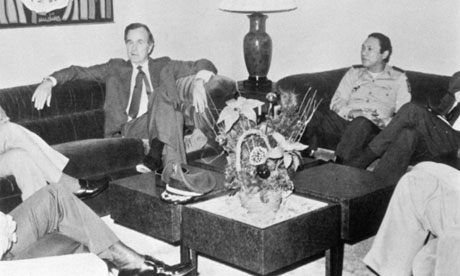By Mark Tran
Tuesday 27 April 2010 11.52 BST
Courtesy Of The Guardian

Vice-president of the United States, George Bush, meets Manuel Noriega in 1983. Photograph: Sygma/Corbis
Before Saddam Hussein there was Manuel Noriega. Like Saddam, Noriega enjoyed US support until he turned into a wayward ally, then an embarrassment, and finally an "imminent danger" who had to be overthrown.
Noriega was recruited as a CIA informant while studying at a military academy in Peru. He received intelligence and counterintelligence training at the School of the Americas at Fort Gulick, Panama, in 1967, as well as a course in psychological operations at Fort Bragg, North Carolina. He was to remain on the CIA payroll until February 1988.
After a military coup in 1968, Noriega quickly rose through the ranks and became head of Panama's military intelligence and a key figure under General Omar Torrijos, the military ruler who signed a treaty with the US to restore the Panama canal zone to Panamanian sovereignty in 1977.
After Torrijos's death in a mysterious plane crash in 1981, Noriega consolidated his power, becoming Panama's de facto ruler, promoting himself to full general in 1983.
Noriega made himself valuable to the US during the Contra wars when he allowed the US to set up listening posts in Panama and by helping the US campaign against the leftist Sandinista regime in Nicaragua. Noriega allowed Panama to be used as a conduit for US money and weapons for the Contras as then US president Ronald Reagan sought to undermine the Sandinistas. But Noriega's increasing brutality turned him into a liability, especially after the assassination of Hugo Spadafora, a political opponent who was found beheaded in 1985.
By the late 1980s, the US turned against Noriega. The 1988 Senate subcommittee on terrorism, narcotics and international operations concluded that "the saga of Panama's General Manuel Antonio Noriega represents one of the most serious foreign policy failures for the United States. Throughout the 1970s and the 1980s, Noriega was able to manipulate US policy towards his country, while skilfully accumulating near-absolute power in Panama.
"It is clear that each US government agency which had a relationship with Noriega turned a blind eye to his corruption and drug dealing, even as he was emerging as a key player on behalf of the Medellín Cartel [a member of which was the notorious Colombian drug lord Pablo Escobar]."
Noriega was indicted by two US federal grand juries in Florida on charges of drug trafficking and racketeering and the CIA took him off its payroll. The next year, Noriega's image as a thuggish dictator was reinforced in the starkest terms as opposition candidates in the presidential election were stopped and beaten up by Noriega's "dignity battalions".
Following a series of incidents that culminated in the death of an American soldier, President George Bush decided it was time for regime change. In December 1989, Bush sent in US troops to overthrow Noriega, offering a $1m reward for information leading to his capture.
"General Noriega's reckless threats and attacks upon Americans in Panama created an imminent danger to the 35,000 American citizens in Panama. As president, I have no higher obligation than to safeguard the lives of American citizens," Bush said at the time.
Operation Just Cause ended in Noriega's capture when he surrendered to US troops after taking refuge in the Apostolic Nunciature in Panama. In one of the more bizarre episodes of the invasion, US forces played loud rock music – including I Fought the Law, by the Clash – to put pressure on Noriega to give himself up. Losses on the US side were 24 troops, plus three civilian casualties. The number of Panamanian civilian deaths was put at about 200, although there are claims that the number is much higher.
Noriega was convicted in Miami in 1992 on multiple charges, including drug trafficking, and sentenced to 40 years. That was reduced for good behaviour and he completed his sentence in 2007. Since then inmate 38699-079, as he was numbered in prison, has dedicated himself to fighting extradition to France, where he has been accused of laundering up to $3m (£2m) of drug money through property purchases in Paris.
No comments:
Post a Comment